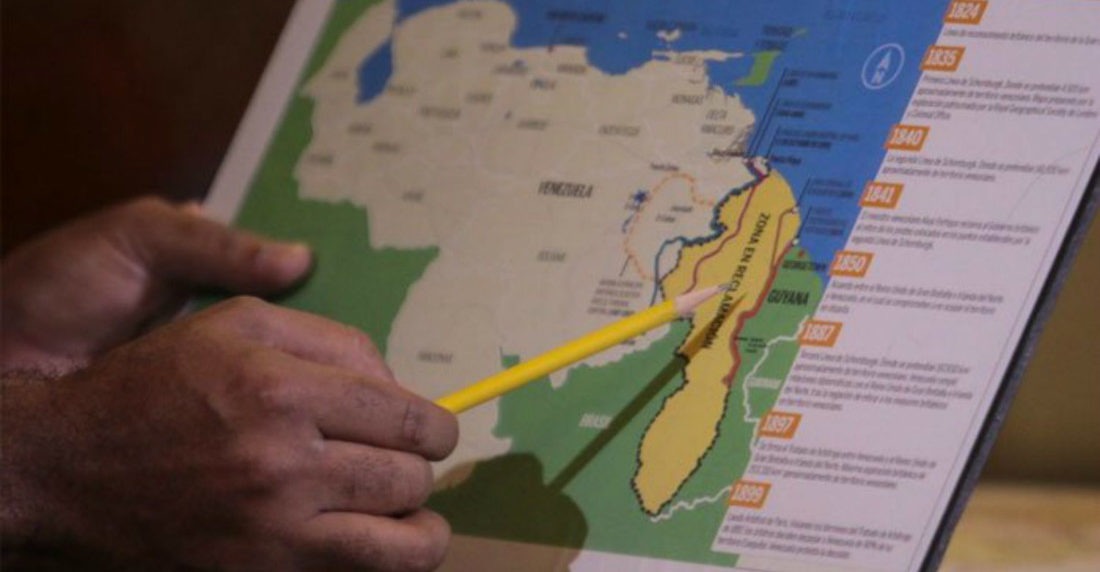
Spanish – Venezuela and Guyana have had a dispute for more than 100 years over the Esequiba, a territory of almost 160,000 square kilometers rich in natural resources. For two decades, Chavismo has boasted a false patriotism. By the omission of Hugo Chávez, Guyana consolidated its possession over a territory similar to the size of a country like Uruguay. Due to Nicolás Maduro’s negligence, the International Court of Justice (ICJ) declared that it had the authority to issue a ruling under unfavorable conditions.
Even the signing of the Geneva Agreement in 1966 did not guarantee a solution to this dispute, which has led the two countries into an endless conflict and several treaties without results.
This new stage could have been avoided if the Venezuelan regime had appeared before the highest UN tribunal in June. “The International Court of Justice decided that it does have the power to resolve the border dispute between Venezuela and Guyana. Now the case goes to the second phase, where the Court will evaluate if the Arbitration Decision of 1899 is valid, as argued by Guyana,” explains the Venezuelan lawyer Mariano De Alba, a specialist in International Law.
El Estatuto de la Corte Internacional de Justicia, que es parte integral de la Carta de la #ONU (un tratado del cual #Venezuela sí es parte), establece que las decisiones de la Corte son obligatorias para las partes en litigio. Venezuela puede participar en la segunda fase.
— Mariano de Alba (@marianodealba) December 18, 2020
The case is complex and has several relevant milestones that seemed to be the answer to the eternal conflict, but the truth is that the Venezuelan regime avoided confronting the problem.
A historic dispute
To understand the subject, it is necessary to go back to 1899 when the United States (representing Venezuela) and the United Kingdom signed the Paris Arbitration Award.
There they agreed to submit the conflict to international arbitration. However, the ruling was in favor of the British, causing inconvenience to Venezuela, which protested before the UN for flaws in the decision since the country did not have direct representation.
In 1966, the Venezuelan government achieved a victory in the UN, when the organism admitted the claim of Caracas on the nullity of the Paris Arbitration Award. The Geneva Agreement was then signed, under which the disputed area remained under the administration of Guyana -which had recently obtained its independence- but without full sovereignty. The conflict was to be resolved amicably between the two countries. Meanwhile, Venezuela would be granted the authority to designate the territory as a Claim Area.
Here appeared Norman Girvan, the “good officiant” of the organism, who would bring both governments closer together, but he died in 2014, and nobody replaced him. The conflict continued.
“Venezuela rejects and repudiates this infamous decision of the International Court of Justice, and we are going to challenge it,” said Nicolás Maduro after learning of the announcement.
An unjustifiable error
Attorney Mariano De Alba highlights that Venezuela had “very good arguments” to try to convince the International Court of Justice that it did not have jurisdiction to resolve the dispute.
Furthermore, he qualified as an “unjustifiable error” that Maduro’s regime decided not to appear and limit itself to sending a report.
The ICJ came on board in 2018 when UN Secretary-General Antonio Guterres asked the court to examine the case. Until then, the United Nations had only exercised a “good offices” function.
Before the first hearing in June of this year- previously deferred because of the pandemic- Chavista Foreign Minister Jorge Arreaza had protested the ICJ’s participation. As mentioned by De Alba, Arreaza refused to participate, limiting himself to issuing only a three-page statement rejecting the video conference meeting because of the pandemic.
“Venezuela will not attend the unusual and irregular hearing called for June 30 by the International Court of Justice on Guyana’s unilateral claim,” wrote Arreaza on Twitter.
In a new display of arrogance, the regime dismissed the opportunity to defend Esequiba. Now, this new decision gives the ICJ a chance to issue a ruling.
The president of the UN high court, Abdulqawi Ahmed Yusuf, announced that the judges decided by 12 votes to 4 that they have “jurisdiction” over the case.
A territory rich in resources
The warning seems to be clear. De Alba explains that Guyana controls the territory de facto, so any decision of the International Court of Justice will have international recognition, limiting Venezuela’s arguments and options.
The country would lose a valuable territory, full of riches not only natural, but of minerals such as gold, diamonds, uranium, oil, and natural gas.
The environmental organization Vitalis had already issued a statement warning about the silence of the Venezuelan authorities.
“Venezuela could lose the great natural wealth of Guayana Esequiba if the neighboring country’s plans to take advantage of it continue to intensify given the diplomatic silence of government authorities and the complicity of international organizations that have been historical witnesses of the litigation,” the text reads.
This factor exacerbates the conflict since the Republic of Guyana’s purpose is obviously to take over the entire territory.
In 2018, the Guyanese government found important oil fields with ExxonMobil, which could lead it to produce 700,000 barrels a day by 2025, the highest production per capita in the world, according to estimates by the oil company.
“In 2025, the GDP will increase between 300% and 1000%. This is gigantic. It will be the richest country in the hemisphere, and potentially the richest country in the world,” said US Ambassador to Guyana, Perry Holloway, about the surprising discovery.
 Versión Español
Versión Español













